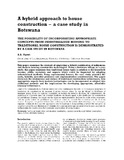| dc.contributor.author | Ngowi, A.B. | |
| dc.date.accessioned | 2009-09-15T10:37:56Z | |
| dc.date.available | 2009-09-15T10:37:56Z | |
| dc.date.issued | 1997 | |
| dc.identifier.citation | Ngowi A.B. (1997) A hybrid approach to house construction – a case study in Botswana, Building Research and Information, Vol. 25, Issue 3, pp. 142-147 | en_US |
| dc.identifier.issn | 0961 3218 | |
| dc.identifier.uri | http://hdl.handle.net/10311/370 | |
| dc.description.abstract | This paper examines the strategy of employing a hybrid combination of indigenous
and modern housing construction technologies. Using a Botswana village as a case
study, this paper examines four traditional house types in relation to the household
income, skills, materials and aspects which could be improved by adapting
industrialized methods. Using experimental houses, the case study provides the
costs, benefits, potential problems and implementation considerations. The paper
discusses the weaknesses and virtues of traditional construction technologies, how
appropriate aspects from modern technologies can be incorporated or adapted into
traditional methods and the implications for developing appropriate, affordable
housing technologies | en_US |
| dc.language.iso | en | en_US |
| dc.publisher | Taylor and Francis, http://www.pdfserve.informaworld.com/940578_73138570 | en_US |
| dc.subject | traditional construction | en_US |
| dc.subject | industrialized construction | en_US |
| dc.subject | appropriate technology | en_US |
| dc.subject | hybrid construction | en_US |
| dc.subject | human factors | en_US |
| dc.subject | affordable housing | en_US |
| dc.title | A hybrid approach to house construction – a case study in Botswana | en_US |
| dc.type | Published Article | en_US |

